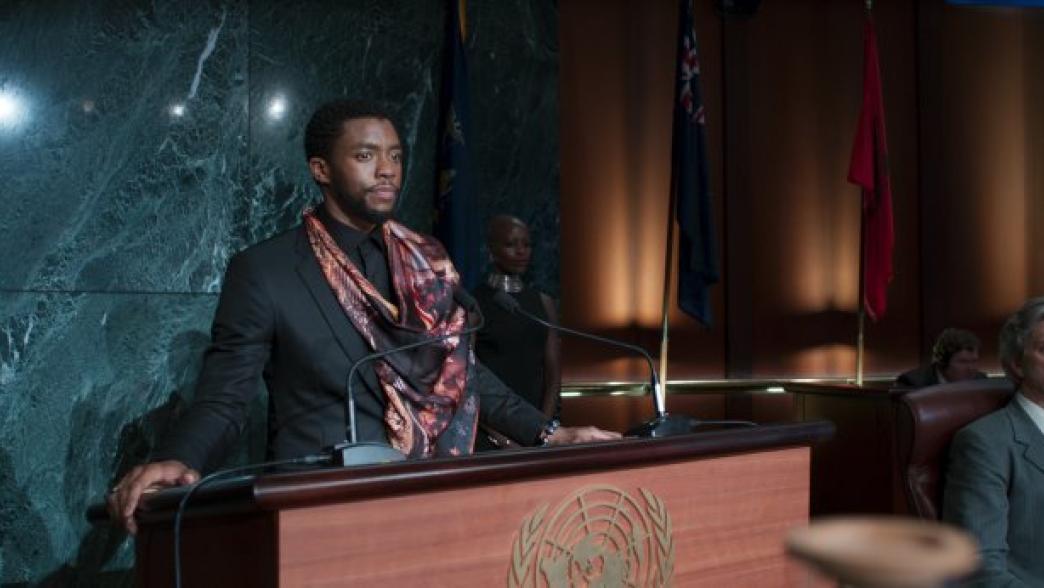
The Political Economy of Black Panther: Who Benefits from Wakanda’s Mineral Resources?
This post is the first of two relating to the film Black Panther; the second is here. The post contains spoilers about the film.
The remarkable success of Black Panther and its resonant storyline has already attracted wide commentary.
Writers in the Guardian and many other media outlets have praised the beautiful picture it paints of a vanguard, economically successful African country spared the horrors of colonization and the injustices of the post-colonial world order (although for some Ghanaian moviegoers, the African accents were not quite realistic). And the policy community has embraced it too: researchers from the Brookings Institution wrote about the film’s lessons for good resource management and increased trade openness in Africa.
But there is also a more uncomfortable quality to Black Panther. Russell Rickford, in the blog Africa is a Country, calls out the film’s political conservatism, the isolationism of the Wakandan elite living comfortably in their resource-rich bubble and the triumph of monarchy over revolution. In Wakanda, after all, political power belongs to the king, T’Challa, appointed for life based on a royal lineage and his fighting skills, with the support of a small oligarchy.
The country’s precious natural resources—the metal vibranium as well as a heart-shaped herb that gives the king supernatural powers—are managed by the royal family, the army and a small clergy. The rest of Wakanda’s population seems to live off the redistribution of the country’s resources.
The institutions and political regime of Wakanda may actually be the result of the domination by vibranium of the country’s economy, and reflect another aspect of the resource curse. One political scientist has analyzed the political economy of Wakanda in that light in a research paper.
In the real world, countries dependent on oil and gas tend to have more authoritarian regimes and fewer civil liberties. On the African continent, elites in Algeria, Angola and Nigeria have organized their countries’ institutions in order to capture the rents from hydrocarbon resources and selectively redistribute the proceeds to maintain power and privileges.
From this perspective, it is easier to understand how some Wakandans so readily accept a complete reversal of their country’s foreign policy by Erik Killmonger, T’Challa’s cousin, when he suddenly comes to power from his exile as a child in Oakland, California. The lack of citizen participation in Wakanda politics explains the weakness of its institutions and the very few obstacles faced by Killmonger when he decides to start a global war.
The work of Paul Collier in particular suggests that resource-dependent countries can be prone to violent conflicts, in part because there is fiercer competition for access to the resources, controlled narrowly by whoever sits on top of the pyramid. In this context, it is unsurprising Killmonger seeks to overthrow a ruling king.
Michael B. Jordan’s subtle rendition of Killmonger makes him more complex than your typical Marvel villain. He has strong political arguments in his favor: he disputes how Wakanda has defined the ownership of its vibranium resources.
While we aren’t privy to the Wakandan constitution (if there is one), the movie leads us to believe that vibranium is controlled by T’Challa on behalf of the Wakandan population, a typical system adopted by resource-rich nations around the world. Killmonger argues that vibranium belongs to all people of African descent, and should therefore be used to fight oppression faced by black people everywhere. This perspective is emphasized in Black Panther’s soundtrack, when Kendrick Lamar denounces “Mass destruction and mass corruption/The souls of sufferin’ men.”
Disputes over resource ownership are indeed a recurring theme in civil wars, such as the Biafra war in Nigeria, and fuel militias and separatist movements from Myanmar and Iraq to the Democratic Republic of Congo. Many resource-rich countries have defined revenue-sharing schemes for their natural resources in order to ensure a sense of fairness among the population and avoid conflicts.
The movie ends without a proper redefinition of vibranium ownership. It is still very much under the control of T’Challa, but with emerging programs of “outreach” to share the benefits of vibranium beyond Wakanda. Will T’Challa’s outreach be limited to a token educational program in Killmonger’s hometown and resemble the Heydar Aliyev Foundation in Azerbaijan, run by the country’s first lady, serving to polish the image of the ruling family while it appropriates the country’s oil resources and jails its political opponents? Or will Wakanda find a way to genuinely challenge power imbalances that continue to disadvantage black communities and black nations in today’s global system?
If Wakanda’s royal family truly wants to make the world a better place, and take after the relative successes of Norway and Chile in transforming their abundant oil and copper resources into increased welfare and citizen participation, I would recommend the latter approach. Kendrick Lamar does too, when he challenges T’Challa in the soundtrack: “What do you stand for? Are you a activist? What are your city plans for? / Are you a king or you jokin’? Are you a king or you posin’?”

